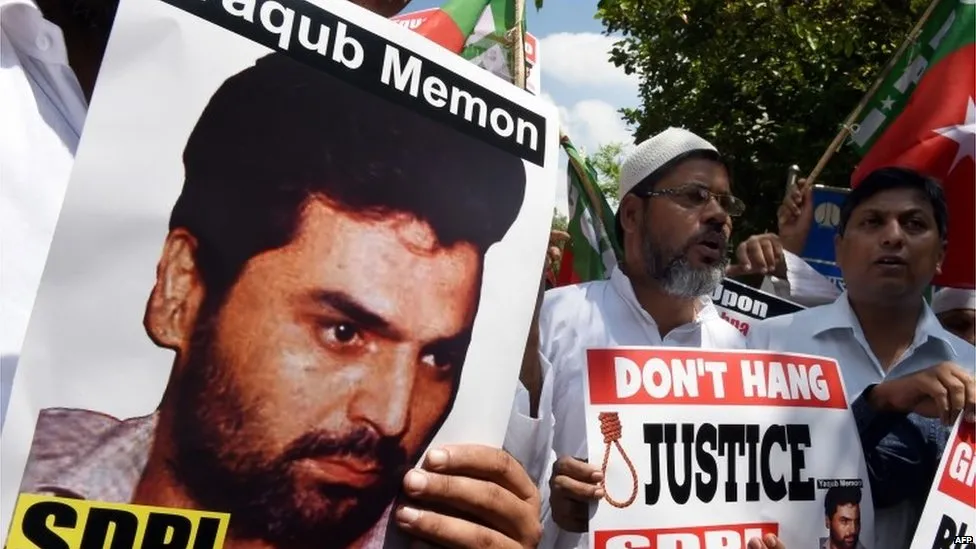There cannot be a better case than Yakub Memon’s to prove that capital punishment should be abolished in this country.
Yakub Memon is an accused in the 1993 Mumbai bomb blasts case in which 257 people were killed. His brother Tiger Memon is prime accused in the said crime. The Supreme Court confirmed death penalty to Yakub. A mercy petition filed by Yakub’s brother was dismissed by the President. The TADA court which tried the case issued a death warrant while a curative petition was pending in the Supreme Court. The curative petition was subsequently dismissed by the court. Meanwhile Yakub filed a mercy petition and also a petition before the Supreme Court contending that the TADA court has not followed its rulings in the Shabnam case in which the court has strongly discouraged executions of persons on death row ‘in haste’. The whole case is falling apart as it is writ with procedural lapses and lack of evidence. There are several loopholes which make a strong case for commutation of the death sentence into life imprisonment. The following are some of the reasons why Yakub Memon must not be hanged unto death:
- The place of arrest is a disputed fact. While the police claim that he was arrested at the New Delhi railway station, Yakub maintains that they nabbed him in Nepal. The veracity of this material fact is questionable.
- One reason for his conviction is that Yakub would know about the conspiracy which took place in his house as he shared the same roof with his brother Tiger Memon. Such a fact might lead to a suspicion but it is not a conclusive proof of his involvement in the crime. There is a likelihood of his knowing but that suspicion in itself is not sufficient to prove his guilt.
- The conviction was based completely on circumstantial evidence. Yakub is entitled to a benefit of doubt on this count.
- He was tried by a special court constituted under the draconian law, the Terrorist and Disruptive Activities (Prevention) Act, 1987 (TADA). The Parliament allowed this infamous law to lapse in 1995 as there was widespread protest against its misuse.
- Yakub was found guilty for conspiring and not for his direct involvement in the crime. The maximum punishment for conspiracy under the infamous TADA is life imprisonment, not death penalty.
- While those found guilty of direct involvement in the commission of the crime were imposed lesser punishment Yakub who is accused of conspiracy is awaiting death penalty. This indicates that Yakub is being punished for the guilt of association rather than for committing the crime. His being a brother of Tiger Memon is not a crime for which he should face the gallows.
- Mr B Raman, a former Additional Secretary in the Cabinet Secretariat who was one of the officers who brought Yakub to justice and played a pivotal role in prosecuting him took an exception to imposition of death penalty on him. In a letter, he stated in unequivocal terms that Yakub deserves a reprieve for providing vital information to the police and for convincing his family members to surrender and face trial. Mr Raman considered this as a mitigating circumstance. Though Mr Raman’s letter is brought to judicial notice through the media much later it has to be taken into cognizance now while considering Yakub’s writ and mercy petitions.
- Various empirical studies including the one recently conducted by the National Law University (Delhi) indicate that most of those who are on death row belong to the marginalized sections including Dalits, backward classes and Muslims. And many other studies also point out that people belonging to disadvantaged sections are not adequately represented in the higher wrungs of the judiciary. The judge who imposed life imprisonment on Maya Kodnani and Babu Bajrangi in the Naroda Patiya massacre case of Gujarat has been receiving threatening calls. Such disturbing facts reinforce the idea that judges are under duress and subject to prejudices as well and judgments are many times reflective of the values of the social milieu.
HRF urges the President to stay Yakub’s execution, slated to be carried out on 30 July 2015, and to commute his death sentence into life imprisonment. There is always a scope of error in judgment. Capital punishment once carried out becomes irreversible. That is one among many reasons why the HRF has been time and again demanding that capital punishment should be abolished in India.
VS Krishna
(HRF General Secretary, AP and TS)
S. Jeevan Kumar
(HRF President, AP and TS)
28.07.2015
Hyderabad
